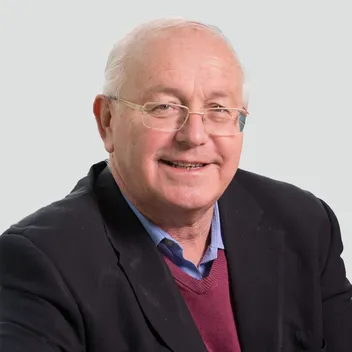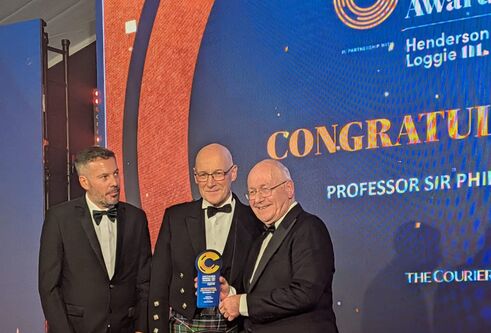Professor Sir Philip CohenFRS FRSE FAA FFMedSci
Chair of Enzymology
MRC PPU, School of Life Sciences

Contact
Websites
Research
Bacterial and viral infections activate the signal transduction networks that regulate the innate immune system, and trigger the production of inflammatory mediators to combat these pathogens. Understanding these signalling networks is important, not just because it may lead to the development of improved drugs to fight infection, but also because failure to control the production of inflammatory mediators causes major global diseases, such as arthritis, asthma, colitis, fibrosis, lupus, psoriasis and sepsis.
My group studies the activation and output of these signalling networks, and we also aim to identify which components are attractive drug targets for the treatment of disease. Another focus is to understand the interplay between protein phosphorylation and protein ubiquitylation in regulating the innate immune system, which we tackle by using a range of state-of-the-art techniques that include molecular, cellular and chemical biology, protein chemistry, mass spectrometry and mouse genetics.
Recently, we have made several unexpected discoveries. First, that hybrid ubiquitin chains containing several linkage types play critical roles in regulating innate immune signalling networks; second that the essential roles of TRAF6 in initiating innate immune signalling are independent of its E3 ligase activity; third that the HOIL-1 component of the Linear Ubiquitin Assembly Complex (LUBAC) is a remarkable E3 ligase that attaches ubiquitin to serine and threonine residues in proteins by forming ester bonds. Current projects are focused on understanding how the HOIL-1 E3 ligase controls innate immune signalling, why the SIK family of protein kinases are required for pro-inflammatory cytokine production, and why the TRAF6 E3 ligase restricts T cell activation. We are also studying how the ubiquitin-binding protein ABIN1 restricts activation of the MyD88-IRAK4-IRAK1 signalling axis to prevent lupus, and dissecting the TLR3 signalling network, which is critical for protection against Herpes Simplex Virus Encephalitis, a devastating disease of the central nervous system in young children.
Impact
In addition to establishing the DSTT research collaboration with the pharmaceutical industry I helped to establish a new company based in Dundee to commercialise the MRC PPU’s phosphorylation reagents and also the kinase profiling service that I established. The company (Upstate) was acquired by Serologicals Corp in 2004 for $205 million which became a subsidiary of Millipore Corp which was acquired by Merck KGaA in 2010. In 2009 I helped to establish Ubiquigent, a Dundee based SME that commercialises reagents in the Ubiquitin field.
Selected Publications
Nanda, S.K., Tsvetana, T., Francesco Marchesi, Marek Gierlinski, Momchil Razsolkov, Katherine L. Lee, Stephen W. Wright, Vikram R. Rao, Philip Cohen and J. Simon C. Arthur (2019) Life Science Alliance published on-line. doi: 10.26508/lsa.201900533
Kelsall, I. R., Zhang, J., Knebel, A., Arthur, J. S. C. and Cohen, P (2019) The E3 ligase HOIL-1 catalyses ester bond formation between ubiquitin and components of the Myddosome in mammalian cells Proceedings of the National Academy of Sciences 116 13293-13298
Nanda, S. K., Nagamori, T., Windheim, M., Amu, S., Aviello, G., Patterson-Kane, J., Arthur, J. S. C., Ley, S. C., Fallon, P. and Cohen, P (2018) ABIN2 Function Is Required To Suppress DSS-Induced Colitis by a Tpl2-Independent Mechanism Journal of immunology 201 3373-3382
Strickson, S., Emmerich, C.H., Goh, E.T.H., Zhang, J., Kelsall, I.R., McCartney, T., Hastie, C.J.Knebel, A., Peggie, M., Marchesi, F., Arthur, J.S.C. and Cohen, P. (2017) The role of the TRAF6 and Pellino E3 ligases in MyD88 and RANKL signaling in mammalian cells Proc. Natl. Acad. Sci. USA 10 1073/pnas/1702367114
Zhang, J.H., Macartney, T., Peggie, M. and Cohen, P. (2017) Interleukin-1 and TRAF6-dependent activation of TAK1 in the absence of TAB2 and TAB3 Biochem J. 474 2235-2248
Nanda, S. K., Lopez-Pelaez, M., Arthur, J. S., Marchesi, F. and Cohen, P. (2016) Suppression of IRAK1 or IRAK4 Catalytic Activity, but Not Type 1 IFN Signaling, Prevents Lupus Nephritis in Mice Expressing a Ubiquitin Binding-Defective Mutant of ABIN1. J Immunol 197 4266-4273
Emmerich, C. H., Ordureau, A., Strickson, S., Arthur, J. S., Pedrioli, P. G., Komander, D., Cohen, P. (2013) Activation of the canonical IKK complex by K63/M1-linked hybrid ubiquitin chains Proc Natl Acad Sci U S A 110 15247-15252
Pauls, E., Nanda, S. K., Smith, H., Toth, R., Arthur, J. S. and Cohen, P. (2013) Two phases of inflammatory mediator production defined by the study of IRAK2 and IRAK1 knock-in mice. J Immunol. 191, 2717-2730 doi. 10.4049/jimmunol.1203268. Pubmed. 23918981, PMC 3849919
Clark, K., MacKenzie, K.F., Petkevicius, K., Kristariyonto, Y., Zhang, J., Choi, H.G., Peggie, M., Plater, L., Pedrioli, P.G.A., McIver, E., Gray, N.S., Arthur, J.S.C. and Cohen, P. (2012) Phosphorylation or CRTC3 by the salt-inducible kinases controls the interconversion of classically activated and regulatory macrophages Proc Natl Acad Sci USA 109, 16986-1699
Awards
| Award | Year |
|---|---|
| Innovation and Knowledge Exchange awards / The Courier Business Awards Outstanding Contribution Award | 2025 |
| National Sciences Prizes awarded since 1990 / Lifetime Achievement Award at The Herald Higher Education Awards 2023 | 2023 |
| Innovation and Knowledge Exchange awards / Lifetime Achievement Award at Scotland’s Life Sciences Awards | 2023 |
| Major Personal Funding Awards / Wellcome Investigator Award | 2018 |
| Honorary Degrees / Honorary Doctor of Science, University Autonoma, Madrid | 2016 |
| International Science Prizes awarded since 1990 / Corresponding Member, Australian Academy of Sciences | 2014 |
| International Science Prizes awarded since 1990 / The Albert Einstein World Award of Science , World Cultural Council | 2014 |
| National Sciences Prizes awarded since 1990 / MRC Millenium Medal | 2013 |
| Major Personal Funding Awards / Wellcome Investigator Award | 2012 |
| Innovation and Knowledge Exchange awards / The Scottish Enterprise Award for Leading Individual Achievement in the Life Sciences in Scotland | 2009 |
| National Sciences Prizes awarded since 1990 / The Royal Medal of The Royal Society | 2008 |
| International Science Prizes awarded since 1990 / Foreign Associate of the US National Academy of Sciences (NAS) | 2008 |
| International Science Prizes awarded since 1990 / Rolf Luft Award, Karoslinka Institute, Sweden | 2006 |
| International Science Prizes awarded since 1990 / Debrecen Award for Molecular Medicine, University of Debrecen, Hungary | 2004 |
| National Sciences Prizes awarded since 1990 / The Royal Medal of The Royal Society of Edinburgh | 2004 |
| Honorary Degrees / Honorary Doctorate of Medicine, University of Linkoping | 2004 |
| Honorary Degrees / Honorary Doctor of Laws, University of Debrecen, Hungary | 2004 |
| International Science Prizes awarded since 1990 / The Bristol Myers Squibb Distinguished Achievement Award in Metabolic Research, USA | 2002 |
| International Science Prizes awarded since 1990 / The Sir Hans Krebs Medal of the Federation of European Biochemical Societies | 2001 |
| International Science Prizes awarded since 1990 / The Pfizer Award for Innovative Science in Europe | 1999 |
| Fellow of Learned Societies and Colleges / Honorary Fellow of the Royal College of Pathologists | 1998 |
| National Sciences Prizes awarded since 1990 / The Croonian Prize Lecture of the Royal Society of London | 1998 |
| Fellow of the Academy of Medical Sciences | 1998 |
| Knight Bachelor of the British Empire | 1998 |
| International Science Prizes awarded since 1990 / The Datta Medal of the Federation of European Biochemical Societies | 1997 |
| International Science Prizes awarded since 1990 / The Louis-Jeantet Prize for Medicine, Geneva, Switzerland | 1997 |
| National Sciences Prizes awarded since 1990 / The CIBA Medal and Prize of the British Biochemical Society | 1993 |
| National Sciences Prizes awarded since 1990 / The Bruce Preller Prize of the Royal Society of Edinburgh | 1993 |
| International Science Prizes awarded since 1990 / The Prix van Gysel of the Belgian Royal Academies of Medicine | 1992 |
| Fellow of Learned Societies and Colleges / Fellow of Academia Europaea | 1990 |
| Fellow of Learned Societies and Colleges / Honorary Fellow of the Hannah Research Institute | 1989 |
| Fellow of the Royal Society | 1984 |
| Fellow of the Royal Society of Edinburgh | 1984 |
| Member of the European Molecular Biology Organisation | 1982 |
Stories
News
Sir Philip was recognised at the awards ceremony for his incredible impact to innovation, fundraising, and his championing of business within the life sciences

News
Kodi Hunter received the award in recognition of her outstanding undergraduate research project undertaken in the lab of Professor Sir Philip Cohen's lab in the MRC PPU, which included an accepted publication in the journal FEBS Letters
News
David Stansfield, who was a Principal Investigator in the Department of Biochemistry at the University of Dundee from 1965 to 2000, revisited the School of Life Sciences on February 5th for the first time since his retirement 25 years ago